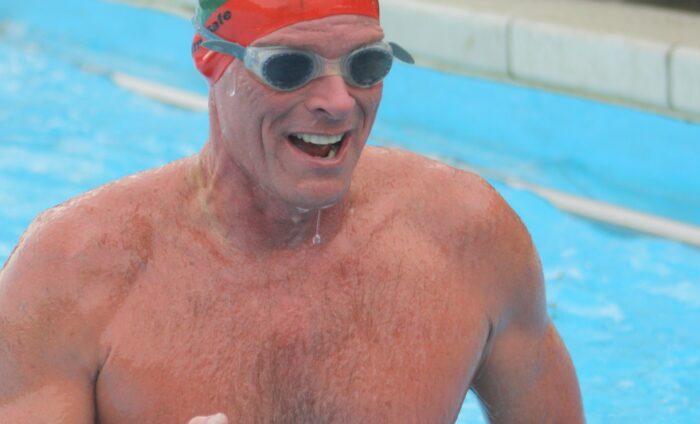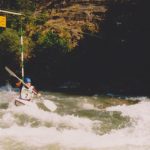
Outdoor swimmers should be realistic and honest about their capabilities
Our sport continues to explode with more events, extreme swims, bucket lists, more swimmers and swimmers pushing for longer distances and other challenges. Participants need to be honest with themselves: for their own well-being, for the safety of other swimmers and the reputation of our sport. Also, if you want access to the best events out there, you should be keeping detailed records of your swimming.
Challenge number ONE: Safety.
The swimmer is the first gatekeeper for safety in any swim. This is especially true in mass participation events where, unlike solo or team marathon swims, the individual swimmer does not have a dedicated safety boat and crew. Before starting any mass participation swim, you should therefore ask yourself if you have 99.99% chance of completing it safely and within the maximum time set by the organiser. That’s right 99.99%: so a failure rate of just 1 out of 10,000 swims. This means, for example, you should have successfully and comfortably completed a 3km before you tackle your first 5km in similar conditions. On the other hand, your odds aren’t great if you’re going from a warm 1-mile race in a wetsuit to a cold non-wetsuit 10 miler, so don’t do it!
Does that seem harsh? Well let’s look at the problems if your lack of experience causes you to get into difficulty on a swim. Firstly, you will require a safety boat to rescue you, meaning less safety cover on the course for the rest of the swimmers. Secondly, you may require medical treatment on site or have to be shipped off to hospital in an ambulance (at taxpayers’ expense). You may even die.
So, forget about your own needs and desires for a moment. Your lack of experience impairs the safety cover for the rest of the event, lowers the enjoyment of other participants, gives the event a bad name, results in bad publicity for the sport, increases insurance premiums for organisers and possibly pushes volunteers to make it their last event.
In brief, entering a mass participation swimming event that you are not supremely confident you will finish is simply inconsiderate.
Challenge number TWO: Access.
Being honest about your swimming capabilities is not only important for the reasons mentioned above, it is likely to become increasingly relevant if you want to access the best swimming events. Many organisers have to limit the number of swimmers they can accept into their event (ignoring the few with 5,000+ mass starts) due to constraints such as available parking, changing and toilet facilities, tides, currents, daylight, medical staff, insurance, and availability of safety boats, kayaks and volunteers. Organisers increasingly find themselves in the position of running lotteries or using selection committees.
I have been on several such selection committees. In 2010, the toughest swim to get into was MIMS (28.5 miles around Manhattan Island). I was part of a named selection committee which picked the 20 or so soloers out of the 80 who applied within one hour of entries opening. Currently I run the Cork Ireland Distance Week, a nine-day training event called the toughest of its kind. Entries are invitation only and, yes, I select. Here is how that works. As an event organiser my biggest nightmare are those few swimmers who should not be in the swim. They are a danger to themselves and more importantly a danger to the other swimmers and the sport. We mitigate the risks by doing a simple review of the swimmer’s credentials.
All these selection processes are similar and ask at least the following questions:
· Do you have a recent proven record that allows me to believe you can safely complete the swim? This means within the last 18 months. I don’t want you if you swam the English Channel 20 years ago and haven’t swum since!
· Are you fast enough to make the cut-off time? This means NOW – not 25 years ago when you were in the Olympics!
· Do you have a poor record or reputation? This would include multiple ‘did not finishes’, refusal to obey the request of a safety crew, showing up late and jumping in when asked not to by the organisers.
For my own event, I look for a mix of veterans who come each year, a global spread of swimmers and up and coming locals.
In the interest of both safety and access all open water swimmers should therefore keep and continually update a swim resume containing the following:
· The total distance you swam each of the last few years and what you are on course to do this year.
· Your pool pace per 100 metres over 1, 3, 5 or 10k (depending on your target distance)
· A clear distinction between swims done in a regular swimming costume and those done in a wetsuit. Locally our last hospital trip was a wetsuit swimmer who decided that our 1,800 metre event was to be his first togs event.
· Any medical conditions that can impact your ability to complete the swim in the expected time. As a general rule be prepared to produce a current medical certificate on request – this is becoming more common.
· A list of your significant completed swims (with locations made clear). This must be done honestly (remember it is the shortest possible distance of the swim not the swim track on your Garmin), include the year, the time, indication of any serious current or tidal assist, conditions (temperature is the key element) and remember that these should be verifiable (the web is an amazing thing). If I see one factual inaccuracy on your resume, I’ll pass.
Finally, let’s say you are an excellent candidate and you’ve been admitted to your dream event, and something just isn’t right before the start (you get injured, food poisoning, delayed in traffic, the worst chest infection ever or you just didn’t do the training expected) then give it a miss. Pull out before you get in the water, please, for everyone’s sake.
Open water swimming is a great sport – please be part of the vast majority who keep it safe for all.








